
The Best Native Plants for Mississauga Yards
Published: 17/10/2022 | Updated: 29/03/2023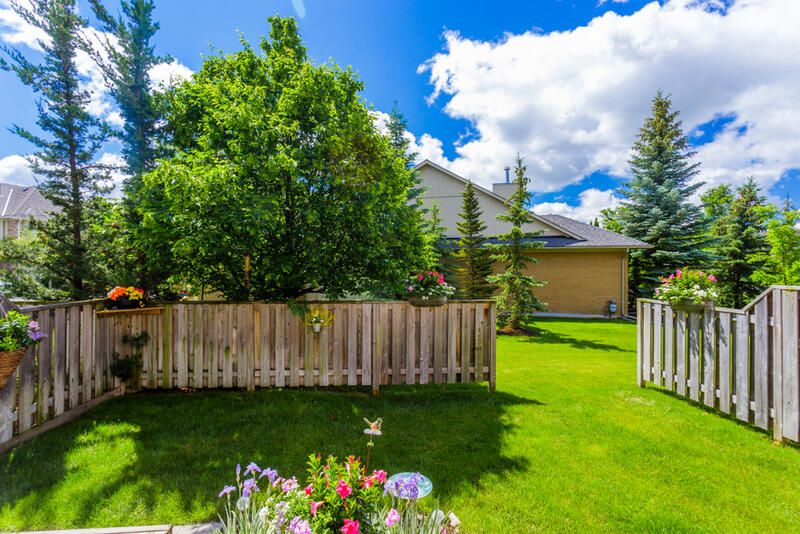
Native plants offer many benefits for your landscaping. Unlike other plants that can grow in a certain region, they're immune to bugs and diseases, which makes them easier to maintain and healthier for the environment.


They're also fast-growing plants and have natural drought resistance – saving your time and water bills!
However, if you live in Mississauga, you'll know that it's not always easy to find sturdy and beautiful native plants. You may have tried before and ended up with something that didn't grow or didn't look very good.
For this reason, ShrubHub has made a short life of our favorite native species that can easily thrive in Mississauga's climate!
Why Bother Searching for Native Mississauga Plants?
Native trees and shrubs are a great way to add some color and variety to your garden. Although they may not be suitable for every situation, these plants are easy to grow and can be found in many different types of settings.
There's no denying that native plants do wonders for the environment and wildlife, but at the same time, they're also able to provide an aesthetic benefit as well.
Canada Wild Rye
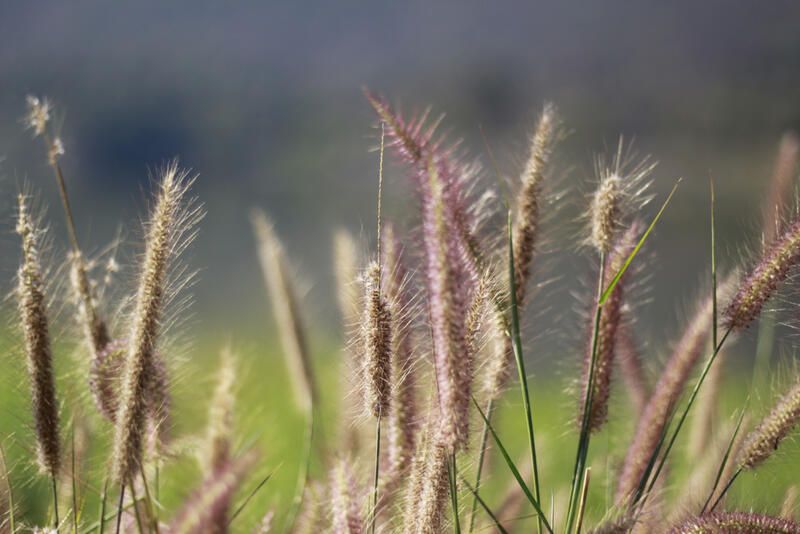
If you're looking for a type of lawn to grow that can happily grow in Mississauga's cold climate, Canada wild rye is the way to go.
It's a perennial grass that has a long life cycle, so you won't have to replant it after every spring season. Its flowers are tiny and white, but they make up for their size with their fragrance: they smell like lemon-scented herbs!
This hardy perennial will grow in any kind of soil—including poor ones. In fact, it's shade tolerant as well; so if you've got shady areas on your property or just want something low-maintenance that takes care of itself over time, this is probably going to be the plant for you.
Canada Bluejoint Grass
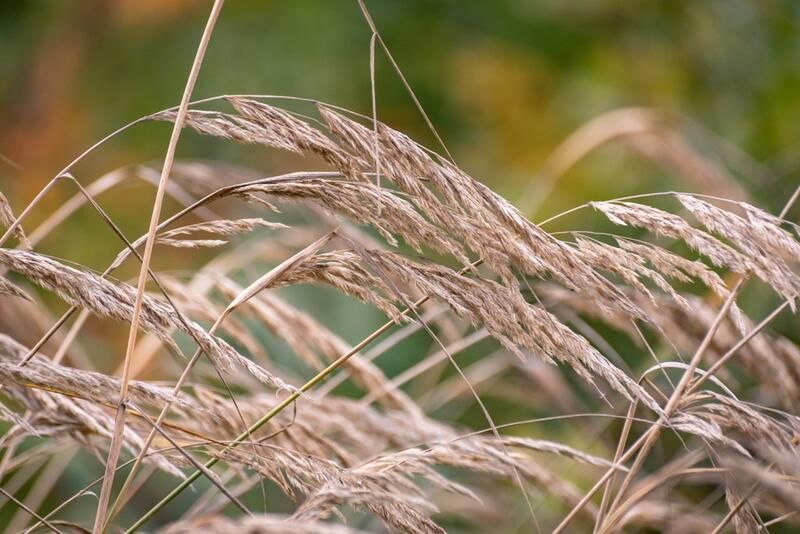
Another plant that can thrive in your Mississauga garden is Canada Bluejoint.
Canada Bluejoint Grass (Calamagrostis Canadensis) is a native perennial grass that grows in clumps of slender, blue-green leaves.
It grows up to 2 feet tall and produces flowers over a long period of time from early summer to fall. This resilient plant can grow in full sun or partial shade and is drought-tolerant!
Harebell
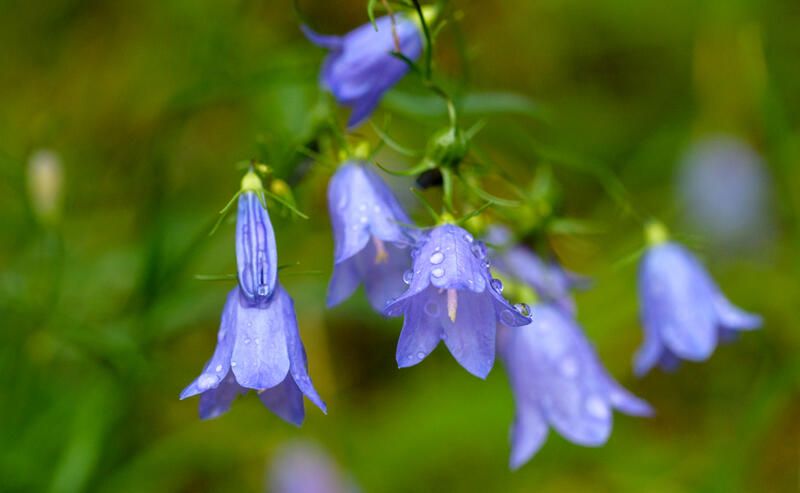
Harebell is a native plant to North America and can be easily grown in your garden. It requires very little maintenance and can be planted in early spring or fall.
It grows best in full sun but tolerates partial shade well. If you live in an area that has harsh winters and want to grow harebells indoors, you should consider planting them in containers so they are easier to move inside when the winter comes around.
Harebells can also be used as ground cover or grown alongside rocks for a beautiful effect!
Purple Coneflower
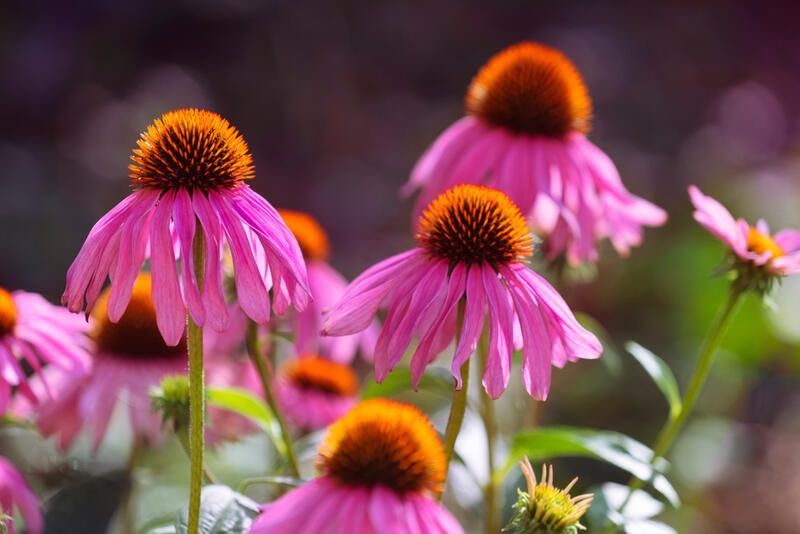
The purple coneflower (Echinacea purpurea) is a perennial native to the United States that can also thrive in Mississauga's weather.
The purple coneflower is one of the most popular varieties of Echinacea plants because it's easy to grow in most climates, even during winter.
It grows in sandy soil and produces beautiful flowers that are large and bright pink or purple. It's also easy to grow, so you can plant this plant in your backyard without needing much effort.
Virginia Mountain Mint
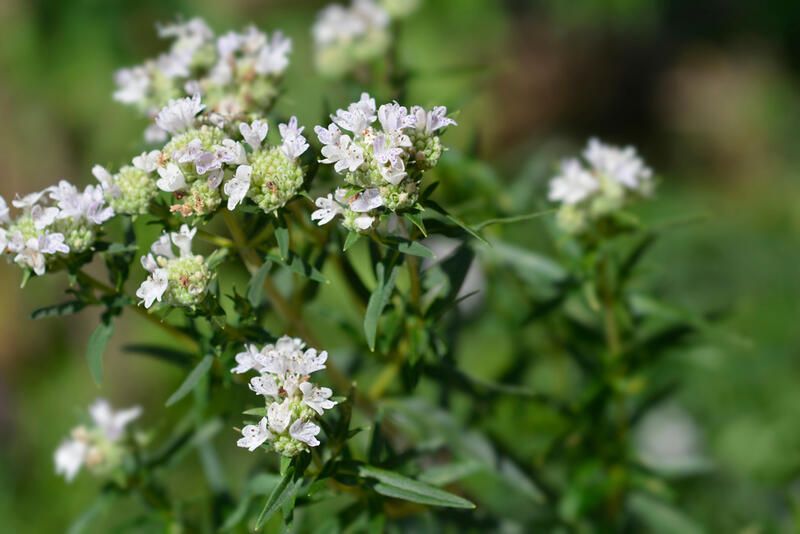
Virginia mountain mint is a native plant that grows in the wild, but it can also be grown as an ornamental.
If you are interested in growing Virginia mountain mint, then you should know that seeds can be collected in late summer or fall and planted in the spring.
In order to ensure your new plants thrive, they will need full sun and moist soil with good drainage.
Prairie Blazing Star
The prairie blazing star is a perennial that grows in full sun or partial shade and is drought tolerant.
This native plant can be a bit tricky to identify because of its similar-looking (but non-native) lookalikes.
Prairie blazing star grows 1–2 feet tall with deep green leaves and large clusters of small yellow flowers that bloom July through September.
New England Aster
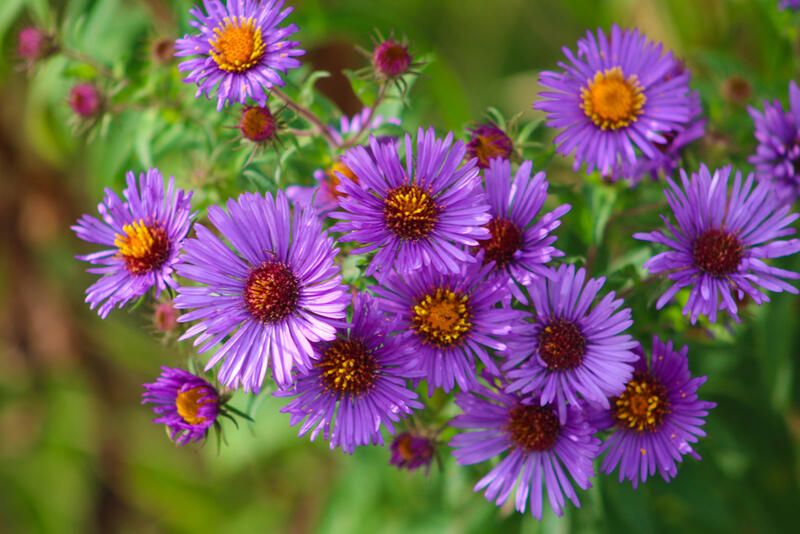
New England Aster, also known as Symphyotrichum novae-angliae, is another beautiful flowering plant that can be grown in a rain garden.
To ensure that your New England Aster can grow healthily, plant it in mid-late fall. However, wait until after a frost so that it gets settled into the ground properly.
If you want more than one New England aster in your garden, don't crowd them together—they need room to grow!
Once established, this plant will thrive all season long but may need some water during dry spells if your soil is sandy or clay-based (like most Mississauga gardens).
Black Eyed Susan
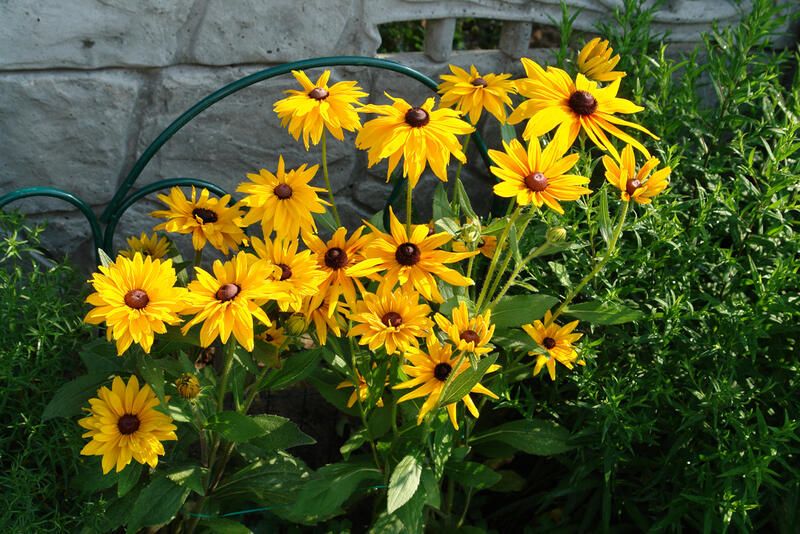
Black Eyed Susan is a perennial that can be grown in either sun or shade. In fact, it's so easy to grow that it's suitable for beginners looking to get into gardening.
It works well as an ornamental border or is planted in pots on porches and patios anywhere they can be found!
The flowers typically bloom later in the summer (early fall), but they'll have their first blooms before the end of July if you plant them early enough.
They're great for flower arrangements, bouquets, and even table centerpieces because they're such a beautiful yellow color!
Goldenrod
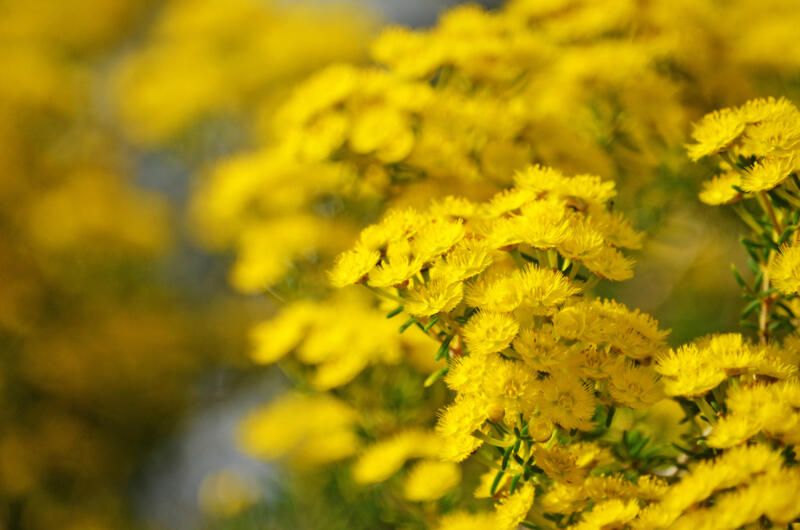
Goldenrod is a perennial native plant that is hassle-free and can be grown in your backyard garden. It has bright yellow flowers and can grow really well in many parts of Toronto.
Goldenrods have narrow green leaves on thorny stems with small hairs along their length; these make them look like miniature pine trees from afar!
It is a good choice for gardens with dry soil conditions, as it needs only moderate watering.
Goldenrod needs full sun to thrive but will survive partial shade if necessary. It thrives under dry conditions and also tolerates droughts very well, making goldenrod an excellent choice for growing in Mississauga.
Goldenrod can grow over two feet tall with its flowering stems reaching up to four feet above the leaves at times during the summer months (from June until September).
Beardtongue
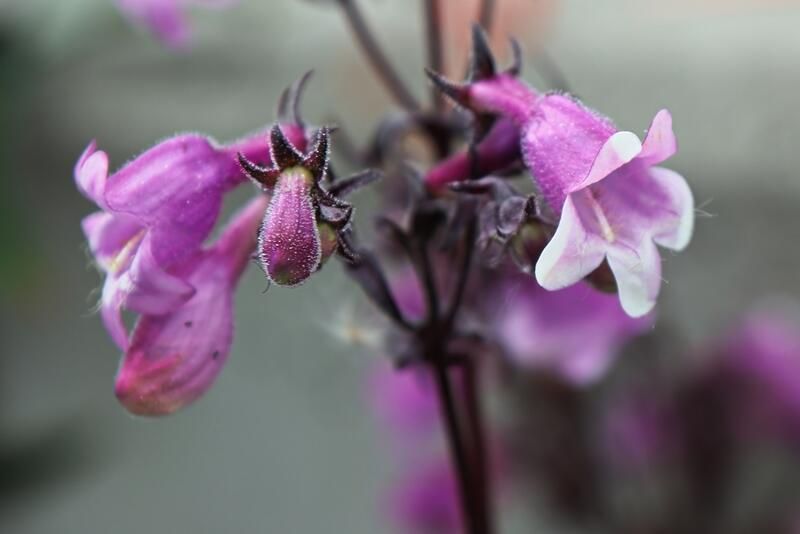
Beardtongue is native to North America, and a popular choice for home gardeners. It's an easy-to-grow perennial that can be used in a variety of ways: as a ground cover (especially in shady areas), as a border plant, or even in containers.
It grows best in full sun but will tolerate partial shade. It can grow up to 2 feet tall—which means it will need some room!
Beardtongue spreads aggressively through rhizomes and seeds, so it's best planted where you don't mind this characteristic (e.g., at the edge of your yard).
Honey Locust
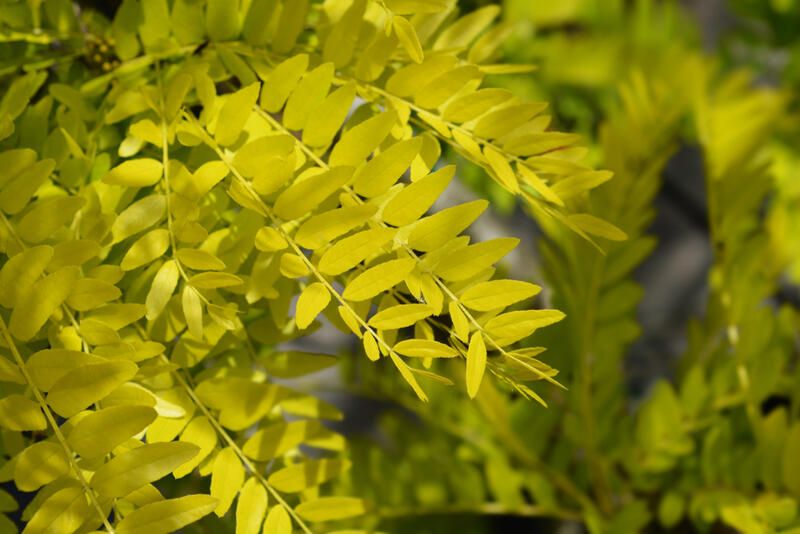
Honey Locust is a deciduous tree that grows up to 60 feet tall. It's native to North America and has been widely grown as an ornamental tree since the early 1900s (especially in cities).
The leaves turn yellow or gold in the fall, making it an attractive addition to your yard. Honey locust also produces pods with edible seeds—but they're not quite as tasty as chestnuts or acorns!
Honey Locust is a hardy, deciduous tree that is low maintenance. Fertilizing and overwatering may actually inhibit its growth because too much sun and water can produce lush new foliage that will be killed by frost in winter.
Finally, Do You Need a Rain Garden?
A question we get asked a lot from our Canadian clients is whether or not their backyard needs a rain garden or not.
If you live in Mississauga, you’re probably familiar with the concept of rain gardens. These are shallow depressions that are designed to capture stormwater runoff from impervious surfaces such as roads and parking lots.
By doing so, they help reduce flooding by allowing excess water to seep into the ground instead of flowing directly into storm sewers.
By planting a rain garden in Mississauga, you can help to improve the water quality of your local watershed. These gardens are designed to capture stormwater runoff and allow it to seep into the ground where it can be filtered through the soil before being released back into the lake.
Conclusion
So there you have it, the best native plants to Mississauga. We hope you enjoyed the list and will be planting some of these beauties in your own backyard.
There are a lot of reasons why we love native plants. They’re beautiful, they provide food for animals and help keep ecosystems healthy. Plus, they’re easy to grow and require far less maintenance than exotic varieties.
If you're looking for the advice of some plant experts, don't hesitate to check out ShrubHub's services! You can book a free consultation session by visiting Shrubhub.com.


